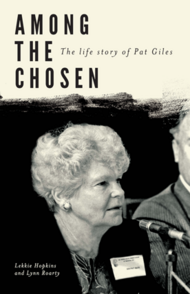Speech: Assoc Prof Alison Bartlett from UWA on Among the Chosen

AWGSA Conference, Adelaide
It’s an honour to be asked to launch this book, and I heartily thank Lekkie Hopkins and Lynn Roarty not only for asking me, but for documenting Western Australian feminist activism in this book, Among the Chosen.
When I migrated to Perth 5 years ago I realised just how little feminist history of the west is known, and even knowable by those over east, south and north, so this book goes some way to making recent activist history knowable.
I met Pat Giles when I first moved to Perth as the mum of my colleague Fiona.I had no idea she was such a legend in WA.
She was involved in both the WLM and WEL from its beginnings in Perth in the early 70s, and was one of 5 women from WEL who spontaneously stood for local government elections in 1972 in one of WEL’s first actions.
She was a trade union organiser in the 70s, the first woman to sit on the executive of the WA Trades and Labour Council, and pivotal in the ACTU’s adoption of the Working Women’s Charter and in getting maternity leave provisions included in industrial agreements.
She spent the 1980s as an ALP federal Senator under Hawke and Keating for 13 years, seeing through the ratification of CEDAW (the UN Convention on the Elimination of all forms of Discrimination Against Women); the Sex Discrimination Bill 1984; Affirmative Action Bill. What a time to be in parliament – momentous for feminist interventions but also profoundly sexist and patriarchal, as the book amply describes.
She was a foundation member in 1985 of World Women Parliamentarians for Peace, and was involved in many international women’s delegations to the UN beginning with the 1975 Mexico conference for International Women’s Year, then Copenhagen in 1980, and leading the Australian delegation to Nairobi in 1985 to evaluate the end of the UN Decade for Women. In the 1990s she chaired the Global Commission for Women’s Health for the UN World Health Organisation.
At the same time as her international activism she remained committed to local organisations, with the Pat Giles women’s refuge recognitioin of her local work, later becoming the Patricia Giles Centre that manages a host of services for women and children escaping violence.
As Hopkins and Roarty write, “She was equally at home meeting with Pakistani Prime Minister Benazir Bhutto, and visiting workers in a women’s refuge in the northern suburbs of Perth” as well as remaining “daft about babies” as grandchildren start appearing. What an amazing mother to have!
The relations between mothers and daughters are always tricky to write but Pat’s relations with her daughters are one of the beautifully handled delights of this book. There is a remarkable sense of the ways in which mothers and daughters politicise each other. For example, pat takes her five children to march in anti-Vietnam rallies, forms a lobby group to campaign for their schooling – the infamous DOGS (Defence of Government Schools) – but then it’s her eldest daughter who joins the ALP before her, whom she follows, and then follows to university to do her undergraduate degree.
There’s a photograph of Pat and Fiona attending the UN General Assembly in New York in 1992 where Pat was Australia’s Parliamentary Advisor – a lovely example of their shared family politics and politicisation.
It must be no easy task writing a life story of someone very much alive, and the tone of this book is noteworthy in its beautiful mix of empathy and scholarly research, story and critical commentary, and great sensitivity to a big life: of family and political activism always centred on women and peace.
The title, Among the Chosen, is from a quote by Giles’ mentor and muse, Irene Greenwood, another iconic Western Australian feminist peace activist.”To be among the chosen who have struggled and suffered for principles enunciated down the ages by those who have loved liberty, is sufficient recompense for along life dedicated to “the Women’s Cause”.
It gives me great pleasure to recommend this book and to officially launch it as a must-have feminist history.
(Alison Bartlett, 1 July 2010)


